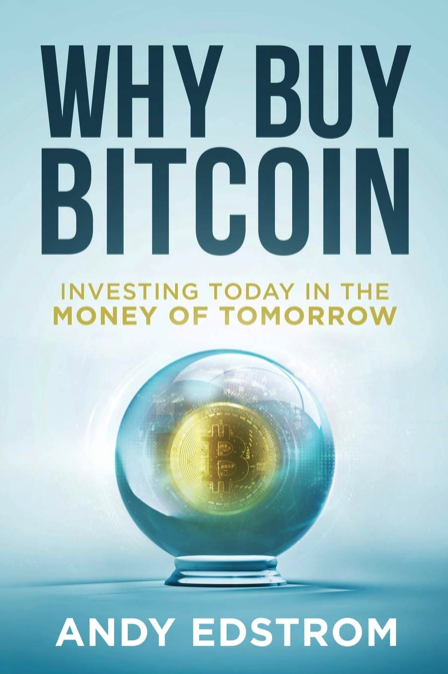
Andy Edstrom, CFA, CFP is Head of Institutional at Swan Bitcoin. He may be best known in Bitcoin for authoring Why Buy Bitcoin, opining that MicroStrategy might borrow in order to buy Bitcoin, and for shaming wealth managers for not owning Bitcoin for their clients. He can be found on Twitter at @edstromandrew, and his podcast appearances and writings can be found at andyedstrom.com.
Interview Date : 10th February 2021
Why did you write Why Buy Bitcoin?
I wrote it for a few reasons. One of the reasons was to educate my clients. I am a financial adviser and a wealth manager, so I invest money for clients to earn them a rate of return. I encountered Bitcoin for the third time in 2017. I had ignored it the first two times, but the third time, I recognized it as perhaps the most attractive investment I would ever come across in my lifetime. So, I felt that I had to explain it to friends, family, my clients, and other people.

Is Bitcoin difficult to understand?
Yes, it is difficult to understand Bitcoin. Although many of the concepts are simple, if you take it at its face, it is money that you can use without someone’s permission and that is scarce. Nobody is taught what money really is, and that was also my personal experience. I managed to take an economics degree from a good college and work in the investment business for a decade and a half before I figured out what money was. It is quite shocking that even people who worked with money for a living don’t understand it fundamentally.
How is the Moral Foundations Theory related to Bitcoin?
Moral Foundations Theory by psychologist Jonathan David Haidt is a concept that I wrote an article with Peter McCormick about. The theory states there are 6 moral foundations that seem to be deep-seated in people’s minds. Groups with these values were probably more successful than others over long periods of evolution. Those six different areas of moral concern are care versus harm, fairness versus cheating, liberty versus oppression, loyalty versus betrayal, authority versus subversion, and sanctity versus degradation.
How are those 6 foundations applied to Bitcoin?
Care versus harm can be applied to environmentalism. Many people think that Bitcoin is unfriendly to the environment, but I think the opposite.
Fairness versus cheating can be understood as the application of how Bitcoin is distributed, including the fact that early adopters may have more bitcoins than later adopters.
Loyalty versus betrayal is near and dear to my heart because I spent a career in the financial system. Generally, the financial system looks after its interests, but Bitcoin is a challenge or threat to it. I see Bitcoin as a betrayal to the financial system, although frankly, the financial system has betrayed the average person for a long time now. I’d say it’s a righteous betrayal in that respect.
Authority versus subversion with respect to Bitcoin is relative to anti-authority. Applying that to money in general, most people were raised to think that it’s the government who must create the money, but Bitcoin challenges that idea.
Sanctity versus degradation is an interesting dynamic. If you look at a $1 bill or a $20 bill, they are all these images of venerated figures. The $1 bill has George Washington, one of the founders of the country and it has the words “In God, we trust” inscribed in it. This is an attempt to associate money with these sacred images or concepts.
Liberty versus oppression is Bitcoin’s strongest aspect. Bitcoin allows you to transact and hold value outside of the legacy financial system. It is “freedom money.”
Why is the psychology of human behavior regarding Bitcoin important?
The psychology revolving around Bitcoin is an important part that has to be discussed. I wrote an article in part to recognize a mistake that I had made which was just trying to convince people that the value of Bitcoin was based on economics. It was very focused on logic and calculation, etc. as opposed to attempting to understand the average person’s psychology and pulling on the threads that might help them understand Bitcoin in other ways. How people feel and understand Bitcoin is critical to how Bitcoin will be adopted.
What are the strongest points you make in your book, Why Buy Bitcoin?
Why Buy Bitcoin was released in September of 2019. One of the strongest points of this book is the explanation of what makes something good money, which almost nobody is taught in school. I believe there are 14 characteristics of what defines good money and no form of money scores highly on all of those characteristics. The 14 characteristics are identifiable, durable, divisible, dense, transferable, scarce, short-term stable, long-term stable, fungible, required for some important purpose, backed by a powerful entity, censorship-resistant, unseizable, and private. Different forms of money have different scores because they have different strengths and weaknesses. This is the piece that most people miss about Bitcoin: they fail to understand what makes something good money and then compare things logically.
How do you measure what is good money?
In the book, I take all those 14 characteristics and I use a 0 to 5 scale, with 0 being the lowest and 5 being the highest. I score the US dollar, gold, and Bitcoin. The total score of Bitcoin is already higher than gold, but it’s still lower than the dollar. But the trend is in Bitcoin’s favor. Gold is not changing. It has been the same for a long time but the U. S. dollar and other fiat currencies are getting printed faster and faster, thus becoming less scarce. Bitcoin is improving because it is getting scarcer. There are all these featured layers being built on top of it to make it better. According to today’s score, the US dollar scores 52, gold scores 46, and Bitcoins scores 47. However, Bitcoin in the future will likely score 57. So, Bitcoin is already better than gold, but in the future, it may also be better than the dollar.
What is Bitcoin’s weakest point?
Among the 14 characteristics of what makes good money, Bitcoin scores lowest at short-term stability. Meaning, short term price stability or short-term value stability is one of Bitcoins’ weakest characteristics today as money. Fortunately, it is getting better and we can confirm that by how its volatility has reduced over time. I expect that as it develops, the volatility will go down even more, but until that happens we should expect significant price falls on the way. Moreover, we should expect that statements and comments by influential people concerning Bitcoin can affect the price exactly.
How do you convince your clients to get exposure to Bitcoin?
If you’re my client, you already have a copy of my book which I sent to you. So, I say “please read the book” first, and if you say “no”, I proceed by saying “I hope you trust me to get you some Bitcoin exposure”. And, so far, I’ve had good success with that. Almost none of my clients have said no to owning Bitcoin.
How is the competition between Bitcoin authors?
Various writers are doing a tremendous job by covering different and important topics about the space. I think there’s not much competition because there’s so much to cover. Most people who get interested in Bitcoin want to read multiple books because each of the books on the market has something to offer. One thing that sets my book apart is discussing the 14 characteristics of what makes good money. That framework is unique to my book. Moreover, it is an investment thesis discussing how to value Bitcoin and what the potential upsides and risks could be as an investment. I wrote for a broader audience with the support of my excellent editor, Beth Rashbaum. She edited one of Stephen Hawking’s books and also Alice Schroeder’s book, The Snowball: Buffett, The making of an American capitalist, one of the most popular Warren Buffett biographies.
Who uses gold as an investment?
As an investment, gold is used primarily by individuals. It’s used sometimes by institutional investors, but rarely by companies to hold on to their balance sheets. So, companies like Tesla and MicroStrategy putting Bitcoin on their balance sheets is a new development.
Why do governments buy gold?
Governments buy gold for a few reasons. Firstly, there have been times in history when gold has backed money. We’ve been on a gold standard or a silver standard for periods in history. Thus, by buying gold, people and investors will have confidence in the country’s currency and demand it to potentially benefit from it. Moreover, China, Russia, and other countries have been buying gold in recent years because they are tired of using the dollar not because it’s bad but the United States has gone to great lengths to make it difficult for other countries to use the dollar. The government has used sanctions and cut countries off from accessing the dollar. Foreign countries don’t like it when the US uses its currency as a weapon. Also, the amount of debt that the US has incurred is worrisome, so for a long time, China, Russia, and many other countries European countries have been thinking about making moves toward a world in which they don’t have to use the dollar.
Is the limited supply of Bitcoin enough for everybody?
It doesn’t matter what the number of Bitcoins is, provided that the number is limited. Whether it’s 21 million or 21 billion is not significant because Bitcoins are divisible to 100 million satoshis per Bitcoin. So even if Bitcoin reaches $20 million in value per bitcoin, one satoshi will be worth about a penny. Even then, if the value of Bitcoin continues to rise, you can have services that will hold the coins but provide smaller denominations. I don’t worry about there being enough Bitcoins in existence. I do think that a fixed supply of money will be better for the economy and the average person in the long run.
What are you looking out for concerning Bitcoin?
I’m always looking at whether it keeps working. If it stops, doesn’t execute transactions roughly every 10 minutes or if it stops moving billions of dollars of value per day, then that will be concerning. If a bug is found in the code that somehow has escaped the scrutiny of developers over the last decade or more, that would also be concerning. Another aspect I’m looking out for is government rectitude or the government’s ability to balance their budgets instead of printing more money. If governments stopped overspending, that would probably be bad for Bitcoin because Bitcoin would not be as attractive relative to fiat currencies.
On the upside, I’m looking for continued adoption of Bitcoin. When you look at a linear graph of the price of Bitcoin, it looks parabolic. However, if you look on a log scale, it’s a pretty clean upward sloping curve over time suggesting a classic adoption scale. We indeed have had these periods of mania followed by huge crashes several times, but if you smooth those out over time, you see that more and more people are using it and the price has kept going up. Tesla buying Bitcoin and putting it on its balance sheet is a sign that it’s being adopted. People like me talk about how they’re buying, and helping their clients getting exposure to Bitcoin is a sign of adoption.
What is the biggest problem with government debt?
The biggest problem with the government debt is that there is too much of it. If governments print and create too much money and continue to lower interest rates, then consumers rationally will borrow more money. For example, if my mortgage interest rate is 8 percent per year, I can only afford to borrow a quarter of a million dollars and service that mortgage. However, if my mortgage interest rate is lowered to 2 percent, I can afford to service a million dollars on the mortgage. The governments have implemented this policy for over 50 years now in which they’ve lowered interest rates that cause people to borrow more. It is a bubble where it forces asset prices to prices up, and it dramatically increases the number of debts in the economy. Such a system drives companies to borrow lots of money, and then when they have a downturn like in a pandemic, they can’t pay their people nor their bills because they’re too indebted. As a result, they have to be bailed out by governments. The biggest problem with debt is that it will make a bad ending for everyone if there’s too much, and I believe there is too much. But even if we had normal levels of interest rates in the world, we would have a great depression. So, that can’t happen and I think the only way out is for governments to keep printing more and more money to procrastinate eventual inflation.
What kinds of basic goods are there and how are they different?
The Austrian economist Carl Menger identified 3 types of basic types of goods: consumption goods such as food, clothing, and everyday utilities, capital goods such that produce consumer goods, and monetary goods, or money. When more money is getting printed, it flows into capital assets, like our houses, real estate, stocks, bonds, etc. However consumption goods have not gotten expensive, or at least, they haven’t gotten expensive as quickly as capital goods or investment goods have. I believe that actual real inflation is higher than what governments say. I don’t believe that inflation is 2% in the United States for goods and services. It must be measured incorrectly, however, inflation in consumer goods has been much slower than inflation in asset prices so far, which I think eventually is likely to change.
Do people demand more dollars?
With respect to consumer price inflation, there is a question of people’s demand for money. People do demand more money because they want to hoard more money when they are nervous about their prospects. Amidst a pandemic, when there’s a good chance you’re going to lose, it’s more likely you’re going to hold on to your cash because you can’t be as confident about collecting a paycheck. However, if the money you are holding is losing value, people start to realize they are losing purchasing power so they will cease to want to hold it at some point. Because humans are herd animals and pay attention to what their neighbors are doing, they will replicate their neighbor’s actions. So, when the government creates massive amounts of money, and suddenly people stop hoarding that money and try to dump it at the same time, it will be a problem the government cannot clean up.
Do you think we have lost the stability of our fiat currencies?
Yes, I do. I think it’s extremely unlikely that government-issued currencies will maintain their purchasing power in the next decade or two. I think they’re likely to lose purchasing power more quickly in the next decade than they have in the prior few decades.
How are stock values so high?
Stocks are valued based on the present value of future cash flows. If I expect a company to make profits in the future, I have to consider its discount rate and its present value today. In principle, when the discount rate goes down, the price or the value of the stock goes up, so the discount rate can be looked at as a long-term interest rate. However, central banks have lowered long-term interest rates that have effectively reduced the discount rate thus increasing the value of stocks.
Another factor is all those bailouts the central bank and the government have conducted. They have bailed out financial markets so many times that investors have become numb to the risk and more confident in making profits. If we consider the tremendous scale of the stock market today, a crash of 30%~ 40% in stock prices would have a real negative effect on the economy. People who own stocks will feel poorer, meaning they will spend less which causes a downward spiral for the economy. So, if the government doesn’t prop up stock markets, we could have a deep recession or a great depression, therefore they are forced to continue to prop up this facade for as long as they can.
Interviewer , Editor : Lina Kamada
【Disclaimer】
The Article published on this our Homepage are only for the purpose of providing information. This is not intended as a solicitation for cryptocurrency trading. Also, this article is the author’s personal opinions, and this does not represent opinion for the Company BTCBOX co.,Ltd.

